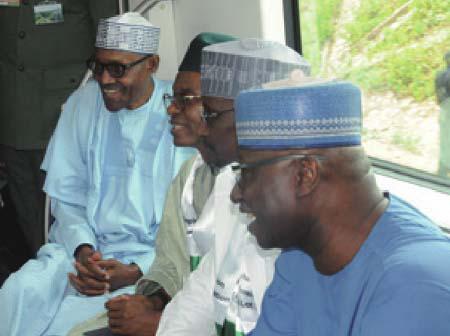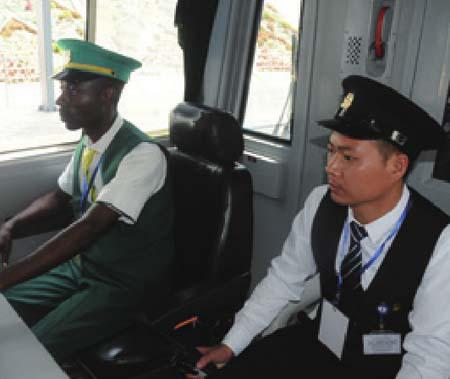STABILITY THROUGH DEVELOPMENT
2018-10-18ByCharlesQnunaiju
By Charles Qnunaiju


Since its founding in 2000, the Forum on China-Africa Cooperation (FOCAC) has, without a doubt, become a world-class international platform with a track record of delivering solid results. The China-Africa traditional friendship and cooperation already had a long trajectory before the establishment of the platform; but FOCAC has not only reengineered these ties in a more result-oriented fashion, but has also created and sustained the mechanism of regular contact and consultation, resulting in pragmatic outcomes in the relationship.
Chinas own exponential burst of growth in the years after FOCAC was established and Africas break with Westerncentric global exposure during the same period provided a sound opportunity on which Africa and China could strengthen their cooperation under the framework of the FOCAC mechanism. The usual suspicions of ideological infractions and Cold War sabotage had already passed by the time of FOCACs founding and therefore, thankfully, it did not have to deal with ideological contestations that infected many international organizations during the period of the intense Cold War.
Belt and Road benefits
Leaders gathering on September 3-4 for the 2018 FOCAC Beijing Summit marked a milestone in the life of the organization, which is still a work in progress.
As its pedigree speaks favorably to its future prospects, FOCAC has brought unique opportunities to its members. Since the historic 2015 FOCAC Johannesburg Summit, Africa has made some giant leaps, as the 10 major China-Africa cooperation plans outlined at the summit by Chinese President Xi Jinping with $60 billion funding support, have substantially materialized.
The first nearly 800-km electrified railway in Africa, connecting the emerging regional industrial hub, but landlocked, Ethiopia, to the port of Djibouti, has become fully operational and has cut travel time from days to hours. With a thaw in relations between former adversaries, Ethiopia and Eritrea, access to the Red Sea through the Assab Port will further fuel industrialization in Ethiopia, with Chinese companies making enormous contributions.
The over 400-km standard gauge railway line from Kenyas port city of Mombasa to its capital Nairobi has been completed and is in operation, triggering increased economic activity for Kenya, while also helping reduce the cost of doing business.
Meanwhile, the Port of Mombasa has been under massive reconstruction and will be a vital artery of the 21st-Century Maritime Silk Road, the seafaring component of the China-proposed Belt and Road Initiative of inclusive and integrated international cooperation. At the Beijing Summit, the initiative, a massive framework of overland, maritime and digital connectivity featuring heavy infrastructure construction across countries and within countries, was prominent as a powerful impetus for fresh development strides already set in motion in Africa by the FOCAC process.

Made in Nigeria with China
As Africas regional powerhouse and its largest market, Nigeria is already at the cusp of a new economic dawn, due to large Chinese-fueled investment in its strategic infrastructure.
Since 2016, the nearly 200-km standard gauge railway line between the capital city Abuja and the northwestern city of Kaduna has been up and running. In July, the first intercity railway connecting the city center of Abuja to the airport, described as the first of its kind in West Africa, was launched amid much fanfare by Nigerian President Muhammadu Buhari.
The construction of a major railway to connect the commercial city of Lagos through Ibadan to the northern commercial hub of Kano has been launched. In addition, the countrys economic recovery blueprint—the Economic Recovery and Growth Plan—which promises massive infrastructure construction as the key to unlocking sustainable and inclusive development, looks set to leverage Chinas concessional funding in the sector. Nigerias notorious epileptic power supply will also receive a massive boost when the China-funded Mambilla Power Station comes on stream. The ExportImport Bank of China recently agreed to 85 percent of the concessional funding for the power project.
Nigerias industrial landscape is fast revitalizing as Chinese enterprises help boost local capacity, to give considerable substance to the concept of Made in Nigeria with China.
Peace through development
FOCAC has accorded Africa a practical and functional international partnership with an uncommon focus on the existential challenge of the core material needs that would put the region not only on the path of economic recovery, but also on a steady and inclusive development trajectory. Chinas belief that Africas security challenges can be overcome and peace prospects can be secured through sustainable and inclusive development has significantly changed and shifted the international perspective, which previously saw Africa as a place of high security risks for investment and business.
Where Africas former colonial masters and their partners in the West view Africas security challenges as obstacles to development, China, through the mechanism of FOCAC, sees economic development as the practical way to overcome security challenges and secure peace, stability and prosperity in Africa. The strategic strides already accomplished in Africa through the cooperation framework of the FOCAC process attest to the pragmatic orientation of the contemporary China-Africa relationship.
With Chinas huge aggregate growth and increased strategic role in global governance, Africas cooperation with China through the framework of FOCAC will see a significant upgrade. The Beijing Summit has built on the enormous progress secured at previous forums and has radically raised the profile of the FOCAC mechanism, especially with the infusion of the vigor of the Belt and Road Initiative, whose several institutional complements such as the Silk Road Fund, the Asian Infrastructure Investment Bank and others are already in full throttle mode.
With the successful 19th National Congress of the Communist Party of China(CPC) late last year, the reelection of Xi as general secretary of the CPC Central Committee and the innovative vitality of Xi Jinping Thought on Socialism with Chinese Characteristics for a New Era, China-Africa cooperation will be injected with fresh dynamism that will help to firmly secure the roadmap for Africas march to its own African Union Agenda 2063.
